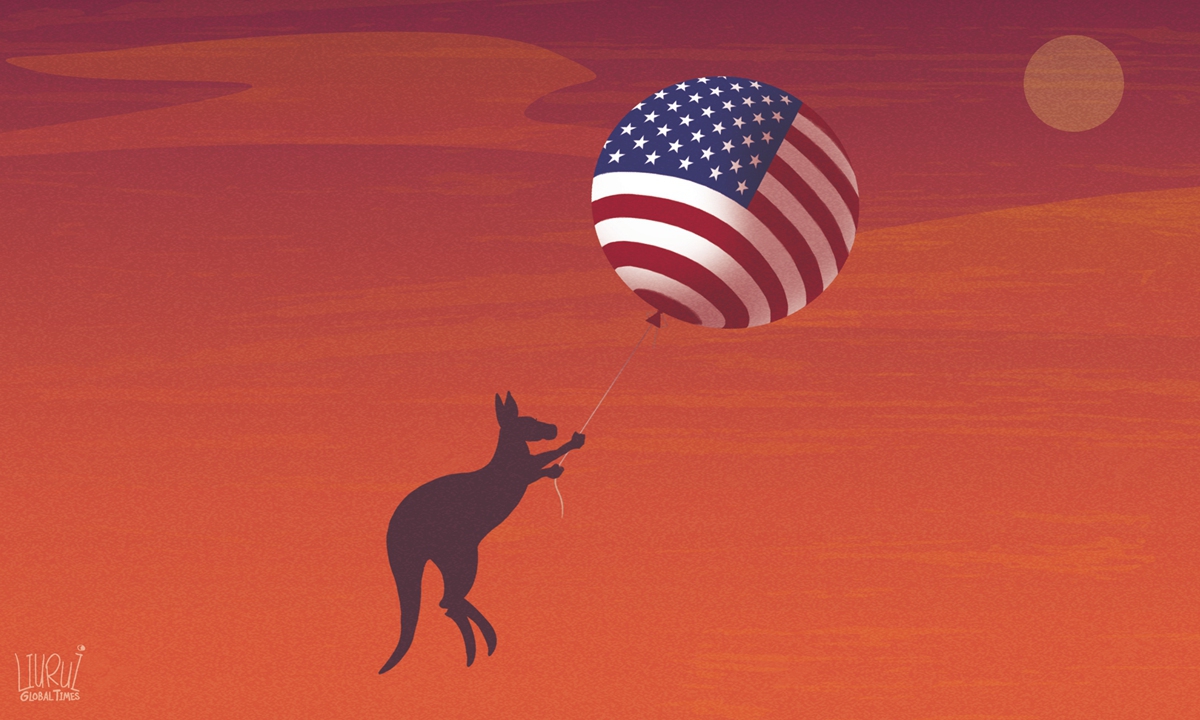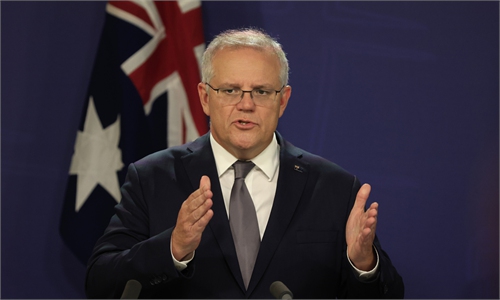
Illustration: Liu Rui/GT
A report by the Sydney-based think tank - United States Studies Centre (USSC) - said that "the majority of Americans are unsure about the value of US alliances." "While the US alliance remains Australia's single most valuable strategic asset, Australia must continue to rapidly evolve its own capabilities, resilience and autonomy," said USSC's Chief Executive Officer Simon Jackman.
Since the 2020 presidential election, US President Joe Biden has repeatedly underlined Washington's intention to reshape its alliance system. But isolationism was once a popular notion in US society. In the context of social division, political polarization, and the lingering impact of Trumpism, the American people's confidence in the US hegemonic system is waning, and isolationism is on the rise again. Many see the alliance system as a negative asset of the US, and are worried that it will be involved in unnecessary and dangerous international conflicts.
Isolationist sentiment will limit the Biden administration's investment in the alliance system. In a bid to gain strategic support from Japan, Germany and others to deal with the pressure from China and Russia, the US will have to give its allies in Europe and the Indo-Pacific region larger strategic autonomy in exchange. As far as the US policy on Australia is concerned, the US may encourage and support it to play a bigger role in the Asia-Pacific and even the Indo-Pacific region, especially in containing China. Washington will incentivize Canberra with approaches such as sharing its nuclear submarine technology.
Australian politicians have impractical ambitions for national identity and diplomatic strategy. They hope to make full use of Australia's diplomacy to shape regional order and dominate regional politics.
Regarding strategic autonomy and resilience, Australia holds a relatively fragmented view - elites generally want to increase their resilience and strategic autonomy against China, but do not advocate resilience or autonomy toward the US. They are accustomed to relying on the US, but are apprehensive about depending on China economically.
Diplomatic and strategic dependence on the US is fundamentally a cross-party consensus among Australian politicians and is supported by the citizenry. It should be noted that there have always been some Australian political elites who are dissatisfied with the country's diplomatic dependence on the US, but their opinions have never been mainstream.
As a middle power with a tiny population, a small domestic market and a relatively weak defense force, Australia has long insisted on following its "great and powerful friend." Whether it was promoting the peace settlement in Cambodia, initiating and establishing APEC, or leading UN peacekeeping in Timor-Leste, it was Washington that provided key diplomatic support behind Canberra's decisions. Therefore, without US support, Australia wouldn't and couldn't afford to be proactive in the Indo-Pacific region.
Australia's understanding of strategic autonomy is different from what is commonly referred to as "autonomy." Canberra has always pursued strategic autonomy within the framework of its alliance with Washington, with alliance being the first priority and strategic autonomy being the second.
Australia believes that the promotion of the US' Indo-Pacific Strategy and the proactive counterbalance to China are in its national interests to safeguard its security. In reality, Canberra's and Washington's interests overlap in general, and their strategic perceptions are almost the same. This is why Australia follows the US before considering its own interests, and sometimes even disregarding them.
In the short term, Australia cannot achieve and is not eager to achieve strategic autonomy. But if it wants to do so, it must first overcome its diplomatic tradition of blindly following its "great and powerful friend." It must form a strategic culture and diplomatic framework based on its own history, culture and national identity. Canberra has to develop an independent and deep understanding of Asia-Pacific affairs to avoid the diplomatic dilemma of taking sides and being hoisted by its own petard.
In addition, Australia needs to demonstrate and prove strategic autonomy in its diplomatic practice, rather than just paying lip service. Canberra blindly following Washington will inevitably make the world see the former as a strategic vassal of the latter. If all nations don't recognize and acknowledge Australia's strategic autonomy, it will be difficult for Canberra to uphold and realize it in the true sense.
The author is an adjunct research fellow at the Center for Australian Studies, China University of Mining and Technology. opinion@globaltimes.com.cn

